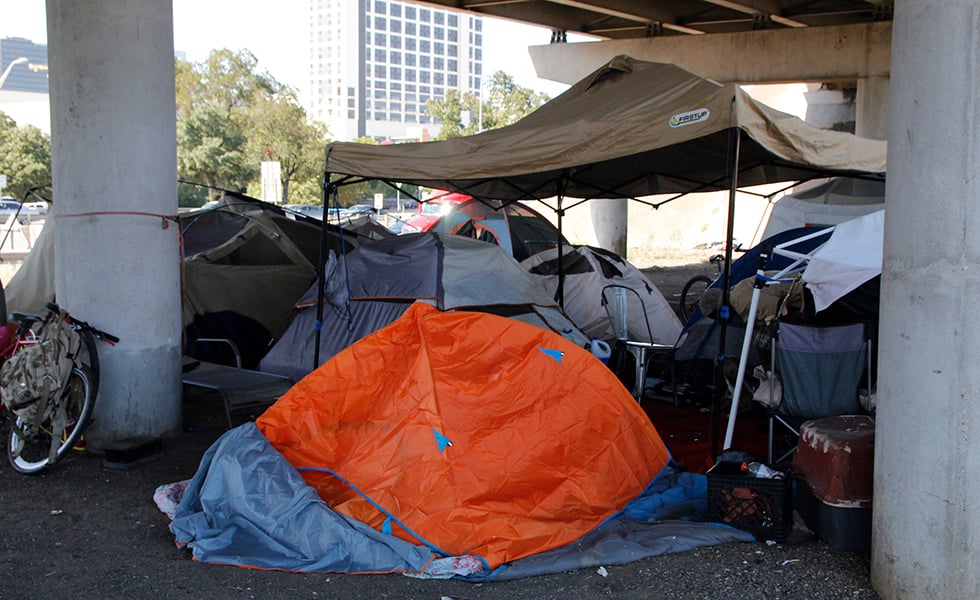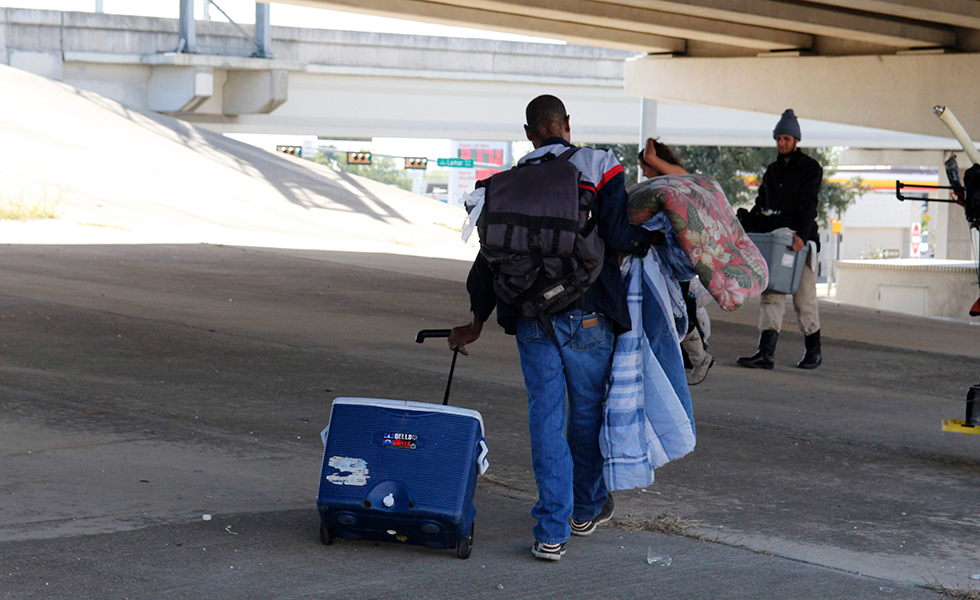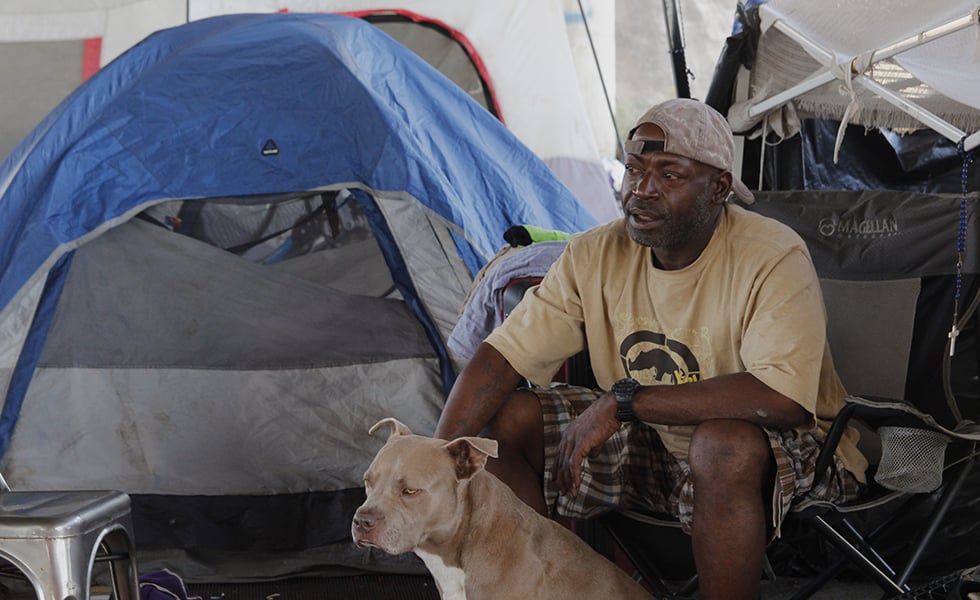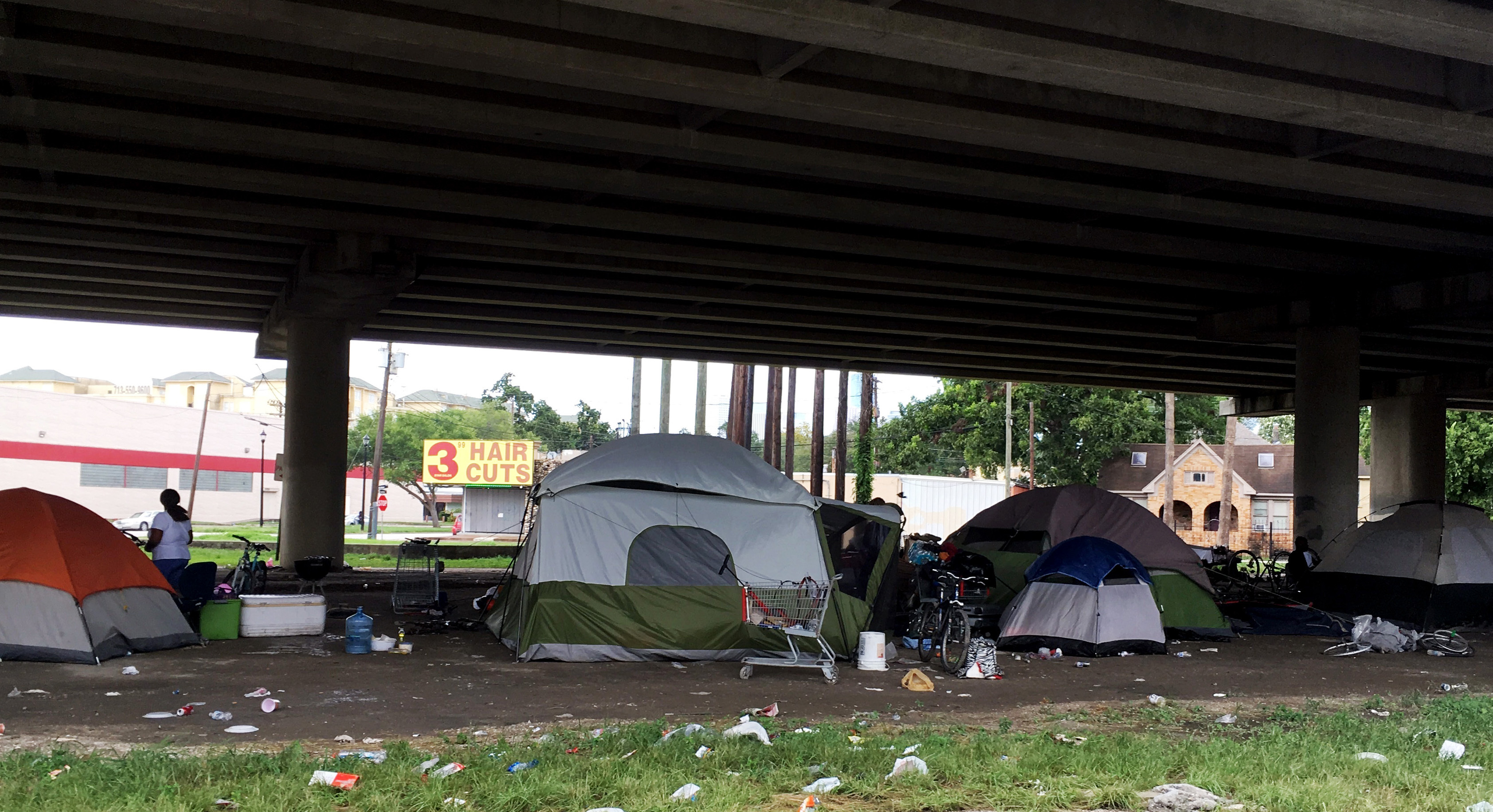
Governor Launches Camp, Backs ‘Mega-Tent’ for Austin’s Homeless, Surprising Advocates
The governor and Austin’s business community announced plans for a temporary campsite and a future “mega-tent” shelter for the city's homeless community. They’re working separately from local homeless service providers.

After a months-long campaign of smearing Austin’s homeless as violent and disease-ridden, Governor Greg Abbott announced Thursday he was designating 5 acres of state-owned land in southeast Austin as an authorized homeless encampment. The same day, with Abbott’s support, the Austin Chamber of Commerce and other business leaders announced they were fundraising for a 300-bed “mega-tent” shelter to be built at an undetermined location. The decisions, which were made public three days after the state began clearing the homeless from the capital city’s highway underpasses, were made with virtually no coordination with the city’s existing homeless service providers.
“There’s not been collaboration with the local homeless crisis response system, and that’s counterproductive,” said Eric Samuels, president of the Texas Homeless Network. He hopes such unilateral moves won’t become a trend. “It’s not something that we want to see happening around the state in the future,” he said.
Advocates aren’t opposed to the camping site or the tent shelter per se, but they’re wary of the governor and chamber’s approach. Austin, like other cities around the country, has been trying to move toward a “housing first” model, which aims to move the homeless into permanent housing as fast as possible. The city passed a $250 million affordable housing bond last year, and more than 500 homeless Austinites have been housed since August, according to the Ending Community Homelessness Coalition (ECHO), the federally-designated lead agency addressing homelessness in the city.
“We believe that ending homelessness in Austin and Travis County is about permanent supportive housing, brick and mortar housing,” said Matthew Mollica, the director of ECHO. Mollica said the governor’s office never reached out about the new camp, and the chamber’s coalition only reached out this week with a perfunctory heads-up. “From our perspective what we really want [instead] is a coordinated response.”
The governor has not released a cost estimate for the new camp, which he says will have restrooms, hand-washing stations, and access to medical providers. The camp is meant to remain open until the chamber and its partners launch their tent shelter, potentially in early 2020. Under the banner “ATX Helps,” the chamber’s coalition aims to raise $14 million for construction and operation costs (money Mollica said could be better spent on permanent supportive housing). The shelter, modeled after an approach San Diego has taken, would provide storage and services to help people exit homelessness, and residents may bring their pets and don’t have to take drug tests. Though the governor supports the coalition and it’s possible the shelter will be on state-owned land, a chamber spokesperson said the group began working on their proposal independently in April. A location has not been chosen, though the group aims to site it within a mile of downtown.
Abbott’s encampment, open as of Thursday, is four miles from downtown Austin. Google Maps estimates a more than hour-long bus ride or more than two-hour walk to get to the city center, where many services are clustered. Still, I asked three residents of a camp near downtown whether they were willing to go to the new site, and they said yes. Raymond Thompson added that medical services and help finding work would be key.
Austin Mayor Steve Adler was cautiously optimistic about Thursday’s announcements, saying the shelter and camp could be helpful as long as they help move people toward housing. “The city will support such efforts with continued focus on permanent housing solutions and we could really use the state’s help here, too,” he noted. City staffers in August recommended against an authorized camping area, in favor of long-term housing.
In a statement, state Representative Eddie Rodriguez noted Abbott’s camp will be in a poor Hispanic part of town, and said that community should be “involved in the conversation.” It remains to be seen whether there will be a NIMBY backlash like there was when the city recently approved a new shelter in South Austin.
On Thursday, the National Law Center on Homelessness and Poverty issued a statement criticizing ATX Helps’ plans. In it, they said that the “mega-tent” shelter will be insufficient to house all of Austin’s unsheltered population, and that such shelters are inappropriate for many with disabilities. The shelter should not be used as a justification to criminalize camping elsewhere, the center warned.
At a Monday press conference, multiple speakers including the chamber’s board chair, Brian Cassidy, said they wanted to move beyond the “rhetoric and vitriol” around Austin’s homeless population. They failed, however, to note that the governor has been the chief promoter of said vitriol. The Downtown Austin Alliance, another coalition member, has come out in support of a court appeal that could overturn a Ninth Circuit ruling that said the homeless cannot be punished for camping when insufficient shelter beds exist. That ruling informed Austin’s decision in June to relax a trio of ordinances that criminalized camping, sitting, lying, and begging in public—the move that triggered Abbott and other Republicans’ Twitter war against the city’s unhoused.
On Monday, the state, at Abbott’s behest, began clearing out homeless encampments under Austin’s highways. Some homeless folks scattered to the city’s wooded areas in response, but many have returned to camping in the same locations. Thus far, the state and city have not prevented their return.
Eric Tars, an attorney with the National Law Center on Homelessness and Poverty, said that any help should have been offered before the highway underpass cleanups. “The mega-tent and even the legalized campground are sort of grand gestures that give the appearance of doing something,” he said. “If they were genuine offers of assistance they would have been offered before the evictions began.”
Tars said the state and business community should join in existing city government and nonprofit efforts to end homelessness in Austin. As for the current lack of coordination, “there’s no reason for it beyond politics,” he said.
Read more from the Observer:
-
Critical Condition: Rural health care is in crisis around the country, but Texas is suffering the most. At least 20 small-town hospitals have closed since 2013.
-
Rahim AlHaj, Iraqi Oud Virtuoso, on How Music Crosses Cultures: AlHaj, who performs in Austin on Friday, is a former political prisoner whose music fuses Eastern and Western influences.
-
When ICE Emptied Out an All-Women Detention Center in Texas, Chaos Ensued: Women formerly detained in Karnes County Residential Center have been lost in the shuffle, facing moved or cancelled court dates, high bonds, and legal confusion.


